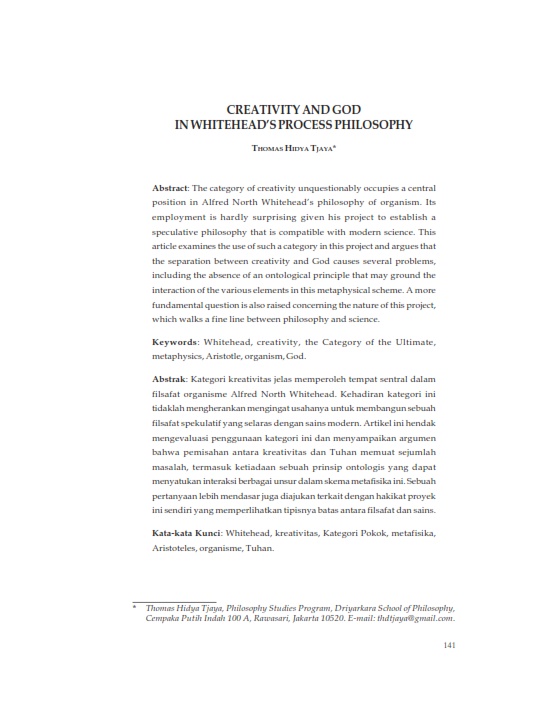Creativity and God In Whitehead's Process Philosophy
Abstract
Abstract: The category of creativity unquestionably occupies a central position in Alfred North Whitehead’s philosophy of organism. Its employment is hardly surprising given his project to establish a speculative philosophy that is compatible with modern science. This article examines the use of such a category in this project and argues that the separation between creativity and God causes several problems, including the absence of an ontological principle that may ground the interaction of the various elements in this metaphysical scheme. A more fundamental question is also raised concerning the nature of this project, which walks a fine line between philosophy and science.
Keywords: Whitehead, creativity, the Category of the Ultimate, metaphysics, Aristotle, organism, God.
Abstrak: Kategori kreativitas jelas memperoleh tempat sentral dalam filsafat organisme Alfred North Whitehead. Kehadiran kategori ini tidaklah mengherankan mengingat usahanya untuk membangun sebuah filsafat spekulatif yang selaras dengan sains modern. Artikel ini hendak mengevaluasi penggunaan kategori ini dan menyampaikan argumen bahwa pemisahan antara kreativitas dan Tuhan memuat sejumlah masalah, termasuk ketiadaan sebuah prinsip ontologis yang dapat menyatukan interaksi berbagai unsur dalam skema metafisika ini. Sebuah pertanyaan lebih mendasar juga diajukan terkait dengan hakikat proyek ini sendiri yang memperlihatkan tipisnya batas antara filsafat dan sains.
Kata-kata Kunci: Whitehead, kreativitas, Kategori Pokok, metafisika, Aristoteles, organisme, Tuhan.

DISKURSUS applies the Creative Commons license (CC BY). We allow readers to read, download, copy, distribute, print, search, or link to the full texts of its articles and allow readers to use them for any other lawful purpose. The author must be aware that the article copyrights will be fully transferred to DISKURSUS if the article is accepted to be published in the journal. Once the manuscript has been published, authors are allowed to use their published article under DISKURSUS copyrights. Full information about CC BY can be found here: https://creativecommons.org/licenses/by/4.0/












